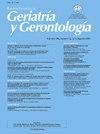老年人不受欢迎的孤独的决定因素:心理和社会人口因素分析
Q3 Medicine
引用次数: 0
摘要
背景与客观老年孤独感与生活质量下降有关,因此确定孤独感的危险因素很重要。本研究考察了65岁以上个体的孤独预测因素,重点关注社会人口学变量(年龄、婚姻状况和教育水平)和心理因素(抑郁症状和绝望)。方法对246名65岁以上独立生活的老年人进行分析。使用以下工具评估变量:流行病学研究中心抑郁量表(CES-D)评估抑郁,贝克绝望量表(BHS)评估绝望,加州大学洛杉矶分校孤独量表评估孤独。应用二元逻辑回归来评估这些变量之间的关系,以及年龄、婚姻状况、教育水平和经历孤独的可能性。结果年龄、抑郁(CES-D)和负面期望(BHS)高分显著增加了孤独感的可能性。研究发现,较高的教育水平是一个保护因素,减少了孤独感的可能性。然而,婚姻状况和BHS上的动机丧失都不是显著的预测因子。结论社会人口学和心理因素对老年人的孤独感有影响。促进社会和教育活动可以减少孤独的风险,解决抑郁症状和消极想法可能会改善老年人的幸福感。本文章由计算机程序翻译,如有差异,请以英文原文为准。
Determinantes de la soledad no deseada en los adultos mayores: un análisis de factores psicológicos y sociodemográficos
Background and objective
Loneliness in old age is associated with a decline in quality of life, so it is important to identify the risk factors for loneliness. This study examines the predictors of loneliness in individuals over 65 years of age, focusing on sociodemographic variables (age, marital status, and educational level) and psychological factors (depressive symptoms and hopelessness).
Methods
An analysis was conducted with 246 older adults over 65 years who lived independently. Variables were assessed using the following instruments: the Center for Epidemiological Studies Depression Scale (CES-D) for depression, the Beck Hopelessness Scale (BHS) for hopelessness, and the UCLA Loneliness Scale for loneliness. Binary logistic regression was applied to evaluate the relationship between these variables, as well as age, marital status, and educational level, and the likelihood of experiencing loneliness.
Results
The results indicate that age and high scores on depression (CES-D) and negative expectations (BHS) significantly increase the likelihood of experiencing loneliness. A higher educational level was found to be a protective factor, reducing the likelihood of loneliness. However, neither marital status nor loss of motivation on the BHS were significant predictors.
Conclusions
The study confirms that both sociodemographic and psychological factors influence the perception of loneliness in old age. Promoting social and educational activities could reduce the risk of loneliness, and addressing depressive symptoms and negative thoughts may improve well-being in older adults.
求助全文
通过发布文献求助,成功后即可免费获取论文全文。
去求助
来源期刊

Revista Espanola de Geriatria y Gerontologia
Medicine-Medicine (miscellaneous)
CiteScore
1.90
自引率
0.00%
发文量
62
审稿时长
85 days
期刊介绍:
Una revista de gran prestigio por sus artículos originales de investigación y revisiones. Permite cubrir todas las áreas de la medicina pero siempre desde la atención al paciente anciano, y está presente en los más reconocidos índices internacionales.
 求助内容:
求助内容: 应助结果提醒方式:
应助结果提醒方式:


